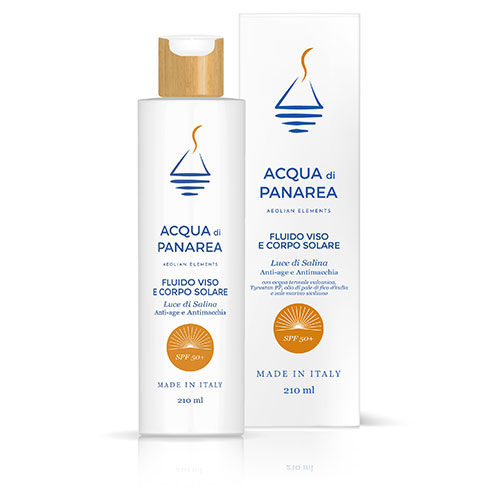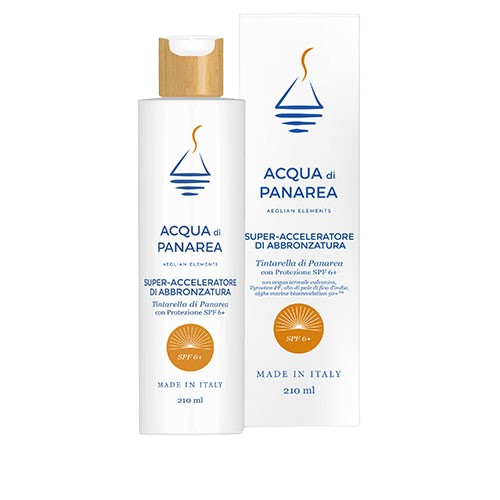The topic sunscreens is peak in the summer time but, it is good to always remember, these should be applied year-round, because our skin always needs protection from the sun's rays.
Choosing sunscreen, however, is certainly not easy, because there are so many more or less good products on the market. But not only that. In making the choice, it is essential to know theINCI of sunscreens and often the long list of ingredients in some products is difficult to decipher.
What to do, then? In recent years, we see an increasing focus on the potentially harmful ingredients contained in some cosmetic products, and without a doubt, sunscreens are no exception. Among the most discussed ingredients are parabens and petrolatum.
Parabens are chemical preservatives used to prevent the growth of bacteria and mold in cosmetic products. Over the years, however, they have been linked to health problems such as endocrine dysfunction, as they can mimic estrogen in the body. On the other hand, petrolatum, petroleum derivatives, are used for their emollient and moisturizing properties, but raise concerns about their potential to clog pores and possible health consequences.
Let's see how to choose paraben-free and petrolatum-free sunscreens, to be mindful of our health and the environment.
Also read Worst sunscreens: what ingredients to avoid
What are parabens
Parabens are a class of chemical compounds which are used as preservatives In cosmetic products, but also in pharmaceuticals.
The function of parabens is essentially to. Prevent the growth of bacteria, fungi and mold. This means that they ensure longer product life and, consequently, greater safety.
The most common parabens include methylparaben, propylparaben, butylparaben and ethylparaben, preservatives found in so many beauty products, including sunscreens, lotions, shampoos and makeup just to name a few.
In recent years, these preservatives have been the focus of much debate, and this is mainly because of concerns about their safety. In support of the fact that it is preferable to choose paraben-free cosmetic products there are now a number of researches, which have raised not a few doubts about their impact on human health, particularly for their potential effect of endocrine interference.
Delving deeper, we can say that parabens can mimic estrogen, the female hormone, by binding to estrogen receptors in the body and altering normal hormone function.
Hence the inferences of some scholars who have linked parabens to certain health problems, mostly related to the endocrine system. Another controversial aspect of parabens concerns their ability to penetrate the skin.
In support of this claim, studies have been conducted that have suggested that these compounds can be absorbed and metabolized by the body. Be careful, however, because it is equally important to point out that the regulatory agencies, namely the FDA in the United States and the EMA in Europe, have stated that the parabens are safe within concentration limits Which are currently allowed.
However, this does not detract from the fact that there are many people prefer to avoid these ingredients altogether to reduce the risk of potential long-term adverse effects.
Growing awareness about parabens has led to an increase in demand for paraben-free cosmetic products, prompting many cosmetic companies to develop safer alternatives.
Le paraben-free sunscreens have become popular among health- and beauty-conscious consumers who seek to protect their skin from sun damage without exposing it to potential harmful substances.
For this reason, choosing safe and paraben-free products may be the best solution. This means opting for a sunscreen safer and more natural.
In addition to avoiding parabens, many of these creams are formulated with organic and natural ingredients, such as plant extracts and essential oils, which provide additional benefits for the skin. When choosing a sunscreen, it is important to carefully read the ingredients in it and research the products, so you can ensure that you are making a informed choice That meets your health needs and priorities.
What are petrolatum
Petrolatum are some petroleum derivatives which are usedi in cosmetic and pharmaceutical products for their emollient and moisturizing propertiesi. Their use is justified by the ability to Create a barrier on the surface of the skin That, therefore, prevents moisture from being lost. This means that, potentially, this type of ingredient could protect your skin from external agents.
For this very reason, petrolatum products are used in a wide range of products, including sunscreens, body lotions, lip balms, and hand and foot creams.
Due to their ability to form a protective barrier, they are particularly effective in the treatment of dry and cracked skin, and are often recommended for protect the skin in extreme weather conditions.
However, the use of petrolatum in cosmetic products has raised some concerns. One of the main ones is the potential contamination with carcinogenic impurities during the refining process. To ensure the safety of petrolatums used in cosmetics, it is essential that they are properly refined.
In the European Union there are. strict regulations imposing high purity standards for petrolatum used in products intended for skin contact.
Another concern relates to the ability of petrolaties to clog the pores of the skin, causing acne and other skin problems, especially in people with oily skin. This occlusive property, although beneficial for retaining moisture, can be counterproductive for some skin types, and this is a detail that should never be underestimated.
What to do, then? In response to the many health-related concerns, some consumers are constantly looking for petrolatum-free sunscreens and other products free of these substances, going for natural and organic ingredients that offer similar benefits without the associated potential risks.
In particular, the petrolatum-free solar products are fortified with ingredients such as shea butter, coconut oil, jojoba oil and other plant oils, which provide hydration and protection without clogging pores or introducing potentially harmful substances into the skin.
If you are careful about the health of your skin, you should opt for paraben- and petrolatum-free sunscreens so that you have for a more gentle and natural sunscreen.
Why they are used in sunscreens
As mentioned, petrolatum and parabens are ingredients used in the cosmetics industry, but there is a need to understand why this use is made. Broadly speaking, we can say that these are ingredients used for their specific functional properties, which contribute to the effectiveness and durability of the product containing them.
Let's delve into this topic. I petrolatum are used mainly because they form a barrier on the surface of the skin that helps retain moisture, preventing dehydration.
This is why they are used in sunscreens, as exposure to sun and water can dry out the skin.
Not only that. Petrolatums are chemically stable and do not easily degrade. This feature helps prolong the life of the sunscreen, ensuring that it remains effective throughout the indicated period of use.
As for, however, the parabens are used for their function as preservatives that prevent the growth of bacteria, fungi and mold in cosmetic products. They are included in sunscreens precisely because they can keep a product free from contamination until the expiration date.
It should also be considered that parabens are compatible with a wide range of cosmetic ingredients, making them versatile and easy to use in the formulation of different types of products, including sunscreen products.
Despite the functional benefits of petrolatum and parabens, it is also a reminder that there are growing concerns about possible risks to the skin health.
Petrolatums, if not properly refined, can contain carcinogenic impurities, and their ability to occlude pores can cause skin problems. Parabens, on the other hand, have been linked to endocrine disruption and other health problems.
Looking for safer and more natural alternatives is the way to go, especially now that many cosmetic manufacturers are responding to this demand by creating sunscreens without petrolatum and parabens, instead using natural and organic ingredients that offer similar benefits without the associated potential risks.
See also: the best sunscreen brands.
Why it is best to avoid sunscreens with parabens and petrolatum
Avoiding sunscreens with parabens and petrolatum can be a wise choice if you want to take care of your skin in a more natural and safe way. Let's delve into this issue together.
Parabens have been the focus of much discussion for years because of their ability to mimic estrogen, the female hormone, in the body. This phenomenon of "hormone mimicking" can disrupt the normal endocrine balance, bringing with it hormonal dysfunctions that can have serious consequences.
If you are careful about your health, avoiding parabens may be a precaution worth considering.
Petrolatum, on the other hand, are petroleum derivatives, and although effective in retaining moisture, they can contain carcinogenic impurities if not properly refined.
The idea of applying a petroleum derivative to your skin may not be appealing if you want to include natural products in your beauty routine that will not clog your pores, causing problems such as acne, especially if you have sensitive or oily skin.
We must also emphasize that products that have petroleum derivatives in them are not only a problem for our skin, but also for the environment.
Oil extraction and processing have a significant impact on the ecosystem, contributing to pollution and destruction of natural habitats.
The beauty industry has made great strides in the Development of safe and effective alternatives to parabens and petrolatum. Sunscreens formulated with natural ingredients offer a effective sun protection without compromise.
These products also often contain Antioxidants and nutrients beneficial to the skin, offering comprehensive protection and care without related problems.
Why prefer sunscreens with natural or plant-based ingredients
Preferring sunscreens with natural or plant-based ingredients represents a conscious choice that goes beyond simple UV protection. This approach reflects a skin care philosophy embracing sustainability and long-term health.
First of all, natural and plant-based ingredients offer a sunscreen that not only screens out harmful rays but nourishes and respects the skin. Some ingredients that are present in natural sunscreens provide a Physical barrier against UV rays without penetrating the epidermis.
Unlike chemical filters, which can cause irritation or allergic reactions, these mineral remain on the surface of the skin, reducing the risk of sensitization and inflammation.
Choosing plant-based sunscreens also means benefiting from properties not to be underestimated. Oils such as coconut, jojoba and avocado, rich in vitamins, antioxidants and essential fatty acids, not only moisturize the skin but they help to repair it and regenerate it After exposure to the sun.
Not only that. Extracts such as that of aloe vera, the chamomile, the green tea offer additional Calming and anti-inflammatory benefits, improving the overall health of the skin and promoting a feeling of well-being.
Another significant advantage of natural sunscreens is the absence of potentially harmful chemicals. Free of parabens, petrolatum, phthalates and other synthetic substances, these creams Reduce the risk of endocrine interference and other issues linked to long exposure to chemical preservatives and petroleum derivatives.
This is especially important for those with sensitive skin or those who are aware of the impact such substances can have on long-term health.
La sustainability is another key aspect of natural sunscreens. Plant-based ingredients are biodegradable and have a reduced environmental impact compared with synthetic chemical compounds.
Finally, the sensory experience offered by natural sunscreens is often superior. The light textures, the delicate fragrances and the feeling of freshness on the skin make the application of these products a daily pleasure, turning an act of protection into a ritual of care and well-being.
Our sunscreens
We have created a series of sunscreens with natural ingredients that will allow you to go no longer buy products with parabens or petrolatum to protect your skin from the sun's rays.
Light of Salina Is one of our flagship products. It is a sunscreen fluid with protection 50+ Rich in natural substances, nutritious products, anti-aging e anti-stain.

Luce Salina is A face and body emulsion with SPF 50+ sun protection which offers you daily protection precisely because of its valuable active ingredients. Made with a blend of UVA-UVB shielding filters, is ideal for thedaily use because it goes to protect your skin effectively and from the very first exposures.
The composition of this product also makes it perfect for fair and delicate skin. Inside you will find theArgan oil and the Plant stem cells from red grapes, natural ingredients support cell regeneration processes and offer powerful antioxidant action.
L'hyaluronan deeply moisturizes the skin, restoring firmness and counteracting dryness caused by UV exposure. L'thermal water volcanic, on the other hand, enriches the formulation with minerals and trace elements that keep the skin hydrated, supple and radiant. Thanks to its soothing action, reduces irritation and redness caused by the sun.
Panarea tan is another of our flagship products designed to protect your skin from the sun's rays. This product guarantees you a sunscreen SPF 6+ which, if the cream is applied daily at least 30 minutes before sun exposure, protects the skin thanks to its valuable active ingredients.

Panarea Tintarella can also be used every day, but it should be noted that we recommend it on already dark and tanned skins, precisely because it has a lower SPF than Saline Light.
Argan oil nourishes the skin, while plant stem cells from red grapes go to activate cell regeneration processes, offering strong antioxidant action. Hyaluronic acid deeply moisturizes, and this is fundamental to avoiding that annoying dryness caused by the sun.
This innovative formulation, which is the result of extensive studies in our laboratories, ensures a'fast, safe and even tan, protecting the skin from the dehydrating effects of sun, wind and saltiness. It also has effective moisturizing, nourishing and anti-aging properties.
L'nourishing and anti-aging action is boosted by the mix of ocean algae rich in omega 3 and omega 6. Moisturizing antioxidants and soothing actives promote anti-aridity, anti-frizz and brightening action. Despite its low protection, Panarea's Tintarella is a safe tanner of the highest quality.




